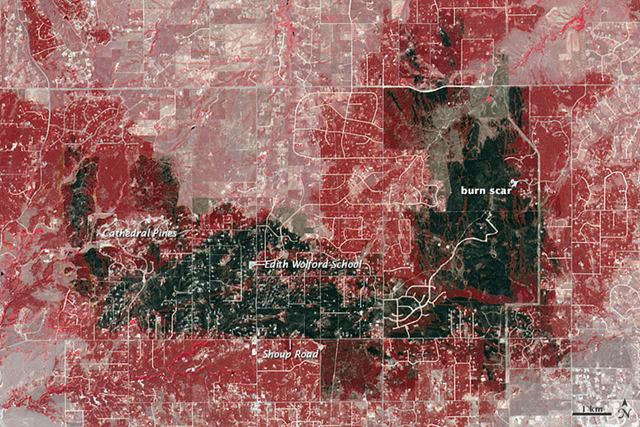Image of the Day: Satellite view of Black Forest fire burn scar, 21 June 2013
By Adam Voiland
21 June 2013 (NASA) – The first 911 call for the Black Forest fire came in on 11 June 2013. Nine days later, firefighters had fully contained the blaze, but not before it had devastated Black Forest, a wooded suburb of Colorado Springs, Colorado. In all, the fire charred more than 14,000 acres (5,700 hectares), destroying 509 homes and killing two people. It was the most destructive fire in the state’s history, eclipsing the Waldo Canyon Fire that struck another part of Colorado Springs in 2012. The Advanced Spaceborne Thermal Emission and Reflection Radiometer (ASTER) on the Terra satellite acquired this view of the burn scar on 21 June 2013. Vegetation-covered land is red in the false-color image, which includes both visible and infrared light. Patches of unburned forest are bright red. Unburned grasslands are pink. The darkest brown areas are the most severely burned. Buildings, roads, and other developed areas appear light gray and white. The most severe damage occurred north of Shoup Road. However, the severity of the damage varied. The Cathedral Pines neighborhood, for instance, escaped largely unscathed. Many residents of Cathedral Pines put rocks around their homes, removed vegetation and dead trees from their yards, avoided using mulch, and followed other fire prevention strategies that helped keep flames back long enough for fighters to save homes, the Denver Post reported. Another key building that escaped the flames was the Edith Wolford elementary school. Though it was in the midst of an area that suffered severe damage, the school survived intact partly because of the large, treeless parking lot surrounding it.
The Aftermath of Colorado’s Most Destructive Wildfire
